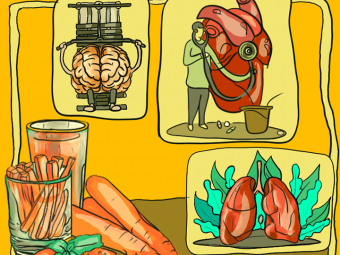Whiskey is made from the fermentation of grains. This distilled alcoholic beverage has at least 40% of alcohol and is available in pale gold to dark amber color. The benefits of whiskey are numerous. When taken in moderation, whiskey may help lower cholesterol levels and reduce the incidence of dementia. It is often considered a social tonic and is consumed by most people to relax.
This article explores the health benefits of whiskey, its nutrition facts, how much of it can you safely consume, and its side effects. Keep reading.
In This Article
What Makes Whiskey Different From Other Drinks?
Whiskey, bourbon, and scotch are all similar drinks but have different tastes. But, while all scotch and bourbon are whiskeys, not all whiskeys are scotch or bourbon. The processes and containers make a difference here.
Whiskey is made with mash from grains like corn, wheat, barley, and rye. It is then allowed to age in charred white oak barrels. However, it cannot age after it is bottled.
Bourbon has at least 51% corn content and is aged only in new smoked oak barrels for at least two years. On the other hand, scotch is made in Scotland with only water and barley and is allowed to age for at least three years. Some producers age scotch for up to ten years to enhance its flavor.
What nutrients does whiskey have? Let us take a look at them in the following section.
Nutritional Profile Of Whiskey
Two fl oz. (around 60 ml) of whiskey contains (1):
| Energy | 96.8 kcal |
| Carbohydrates | 8.6 g |
| Fat | 0.02 g |
| Calcium | 0.65 mg |
| Iron | 0.052 mg |
| Magnesium | 0.65 mg |
| Phosphorus | 3.9 mg |
| Potassium | 3.25 mg |
| Sodium | 13 mg |
| Vitamins C, B1, B2, B3, B5, and A | Trace |
| Alcohol | 9.16 g |
Whiskey may not be replete with all the nutrients, but it still may offer some health benefits. Let us explore the eight health benefits of whiskey in the following section.
Health Benefits Of Whiskey
1. May Help Lower Cholesterol Levels
Dr. Anthony Puopolo, Chief Medical Officer of Rex MD, says, “Whiskey contains high levels of polyphenols (plant-derived antioxidants) that enter alcohol during fermentation. These antioxidants help lower bad cholesterol (LDL) levels and increase good cholesterol (HDL) levels.”
Besides, drinking phenolic-containing alcoholic beverages may also enhance the antioxidant capacity of blood plasma (2).
2. May Benefit Your Heart Health
Research suggests that higher antioxidant levels may help reduce the risk of coronary artery disease (2). In addition, these antioxidants help reduce oxidative stress, which is a major cause of heart disease (3). Research also suggests that the ellagic acid in whiskey may help transport cholesterol from plaque areas and reduce the risk of heart disease (4).
Another study linked low to moderate intake of alcohol with the strongest reduction in adverse cardiovascular outcomes (5).
3. May Improve Blood Sugar Levels
Whiskey has a lower glycemic index (it contains slow-digesting carbohydrates). A study suggests that consuming moderate amounts of alcohol may help reduce the risk of type 2 diabetes (6). However, binge drinking has the opposite effect.
Dr. Daniel Boyer from Farr Institute says, “Moderate whiskey consumption may lower your risk of developing diabetes by up to 40% because it makes the body properly regulate insulin and glucose levels. Controlling your blood sugar levels lowers the risk of developing diabetes.”
4. May Aid In Digestion
Whiskey is a strong alcoholic beverage. Therefore, a drink of alcohol after a meal may help stimulate digestion (7).
“Taking whiskey after consuming a giant portion meal that may result in stomach upsets may help ease your stomach. It does that by stimulating your stomach enzymes since it is high-proof,” remarks Dr. Boyer.
5. May Help Clear Your Sinuses
Research suggests that alcohol, in moderate amounts, can clear sinuses and reduce the congestion in your airways (8). A hot toddy (with hot water, honey, lemon juice, and a shot of whiskey) is believed to help when you are down with a cold.
6. May Help Reduce Cancer Risk
Whiskey contains ellagic acid (a polyphenol) that attacks cancerous cells. The acid inhibits the proliferation of tumor cells, induces apoptosis (cell death), and breaks DNA-carcinogen binding. It also blocks virus infection and disturbs inflammation and other processes required for tumor growth (9).
“Ellagic acid may absorb rogue cells (rare cells with multiple chromosomes in the body) when combined with other forms of medical treatments,” says Dr. Boyer.
However, more specific research is warranted to understand the effects of whiskey on cancerous cells.
7. May Lower Obesity Risk
Studies show that ellagic acid directly affects fatty (adipose) tissues and reduces inflammation. In addition, this acid is an antioxidant that works by reducing fat production at the cellular level. This way, there is lesser fat deposition on your tissues, which may help reduce the risk of obesity.
Growing evidence suggests that ellagic acid may reduce obesity-mediated metabolic complications like insulin resistance, type 2 diabetes, non-alcoholic fatty liver disease, and atherosclerosis (4).
8. May Reduce Risk Of Developing Dementia
Studies show that older adults who consumed up to six alcoholic drinks per week had a lower risk of developing dementia (10). More direct studies on whiskey are warranted in this regard.
On the other hand, older adults who consumed more than 14 drinks per week reported the most severe cognitive decline compared to those who had less than one drink a week (11).
While moderate whiskey intake may offer you these benefits, consuming it in excess may have serious side effects. Keep reading to know more.
Subscribe
Side Effects Of Excess Whiskey Intake
Excess whiskey intake (or any form of alcohol) may increase the risk of addiction (12). “Alcohol is known for calming your nerves. It increases dopamine production in your body and makes you feel relaxed,” says Dr. Rose. But the craving for alcohol increases if the body gets used to increased dopamine levels (13).
Excess intake of alcohol may also increase the risk of heart disease (14). It may also increase blood sugar levels and cause diabetes (6). Besides, drinking more than one drink per day was linked to cognitive decline and dementia (10). One’s liver also sustains the earliest tissue injury from excessive drinking, which may even lead to liver cirrhosis (15).
How much whiskey is safe to drink every day? Which part of the day is best to consume it? Keep scrolling to find out.
The Right Whiskey Limit
As stated above, moderate consumption (one glass per day) of whiskey is recommended to reap its benefits. Moreover, the best time to drink whiskey would be after an evening supper, as digestion slows down at night. Whiskey could also be a good option if you have a big meal at any time of the day and think you need a digestif to help (provided you weigh your options right).
Whiskey is a distilled alcoholic beverage with rich phenol compounds. It is rich in carbs and minerals and exhibits antioxidant properties that help treat many ailments. If consumed in moderation, whiskey benefits your health in many ways. Whiskey intake may help lower cholesterol levels, benefit your heart health, aid digestion, and reduce airway congestion. However, excess whiskey intake may increase the risk of addiction, increase blood sugar levels, and lead to cognitive decline and dementia. Hence, limit its intake and consult your doctor in case of emergencies.
Frequently Asked Questions
Is whiskey good for sleep?
Yes. Many compounds in whiskey stimulate the neurotransmitters in sleep, resulting in sleep-inducing effects (16).
Is whiskey better than beer?
No. Whiskey is a spirit and has higher alcohol content than beer. Drinking more whiskey is more harmful than drinking more beer (17), (18).
Is whiskey good for the skin?
Maybe. Whiskey is rich in ethanol that acts as an antiseptic and disinfectant. However, excess use may dry the skin out (19).
Key Takeaways
- Whiskey is a distilled alcoholic beverage made from grains like corn, wheat, barley, and rye.
- When consumed in moderation, it may reduce the risk of developing dementia, cancer, and heart disease.
- It can also help clear congested sinuses and aid digestion.
- However, excessive whiskey consumption can increase health risks and lead to addiction.
References:
Articles on StyleCraze are backed by verified information from peer-reviewed and academic research papers, reputed organizations, research institutions, and medical associations to ensure accuracy and relevance. Read our editorial policy to learn more.
- Alcoholic beverage whiskey sour
https://fdc.nal.usda.gov/fdc-app.html#/food-details/173662/nutrients - The effect of whiskey and wine consumption on total phenol content and antioxidant capacity of plasma from healthy volunteers
https://pubmed.ncbi.nlm.nih.gov/9805220/ - Antioxidants inflammation and cardiovascular disease
https://www.ncbi.nlm.nih.gov/labs/pmc/articles/PMC4072837/ - Improvements in Metabolic Health with Consumption of Ellagic Acid and Subsequent Conversion into Urolithins: Evidence and Mechanisms
https://www.ncbi.nlm.nih.gov/labs/pmc/articles/PMC5015040/ - Alcohol and cardiovascular health: the dose makes the poison…or the remedy
https://pubmed.ncbi.nlm.nih.gov/24582196/ - Alcohol and type 2 diabetes: A review
https://www.nmcd-journal.com/article/S0939-4753(10)00106-7/fulltext - DISCUSSION ON THE VALUE OF ALCOHOL AS A THERAPEUTIC AGENT
https://www.ncbi.nlm.nih.gov/labs/pmc/articles/PMC2152027/pdf/procrsmed01421-0050.pdf - Alcohol and Airways Function in Health and Disease
https://www.ncbi.nlm.nih.gov/labs/pmc/articles/PMC2081157/ - Research progress on the anticarcinogenic actions and mechanisms of ellagic acid
https://www.ncbi.nlm.nih.gov/labs/pmc/articles/PMC4069806/ - Prospective study of alcohol consumption and risk of dementia in older adults
https://pubmed.ncbi.nlm.nih.gov/12636463/ - Alcohol Consumption and Risk of Dementia and Cognitive Decline Among Older Adults With or Without Mild Cognitive Impairment
https://www.ncbi.nlm.nih.gov/labs/pmc/articles/PMC6777245/ - Understanding Alcohol Use Disorder
https://www.niaaa.nih.gov/publications/brochures-and-fact-sheets/understanding-alcohol-use-disorder - Alcohol and Dopamine
https://www.ncbi.nlm.nih.gov/labs/pmc/articles/PMC6826820/ - Alcohol’s Effects on the Cardiovascular System
https://www.ncbi.nlm.nih.gov/labs/pmc/articles/PMC5513687/ - Alcoholic Liver Disease: Pathogenesis and Current Management
https://www.ncbi.nlm.nih.gov/labs/pmc/articles/PMC5513682/ - Aging of whiskey increases the potentiation of GABA(A) receptor response
https://pubmed.ncbi.nlm.nih.gov/12926865/ - Alcoholic beverage, whiskey sour
https://fdc.nal.usda.gov/fdc-app.html#/food-details/173662/nutrients - Alcoholic beverage, beer, regular, all
https://fdc.nal.usda.gov/fdc-app.html#/food-details/168746/nutrients - Production of first- and second-generation ethanol for use in alcohol-based hand sanitizers and disinfectants in India
https://www.ncbi.nlm.nih.gov/pmc/articles/PMC8155184/
Related
The following two tabs change content below.
- Author

Gayathri Vijay
Gayathri is a biotechnology graduate with a keen interest in research-oriented writing, microbiology, genetic engineering, and psychology and cognitive science…. more



 29 Amazing Benefits Of Figs For Skin, Hair And Health
29 Amazing Benefits Of Figs For Skin, Hair And Health 19 Amazing Benefits Of Black Chickpeas (Kala Chana) For Skin, Hair And Health
19 Amazing Benefits Of Black Chickpeas (Kala Chana) For Skin, Hair And Health 28 Best Shea Butter Benefits For Skin, Hair And Health
28 Best Shea Butter Benefits For Skin, Hair And Health 15 Best Benefits Of Beta Carotene For Skin, Hair And Health
15 Best Benefits Of Beta Carotene For Skin, Hair And Health 29 Amazing Benefits Of Sesame Seeds For Skin And Health
29 Amazing Benefits Of Sesame Seeds For Skin And Health 4 Reasons Goat Cheese Is Better Than Cow Cheese
4 Reasons Goat Cheese Is Better Than Cow Cheese 38 Benefits Of Lime For Skin, Hair, And Health + Nutrition
38 Benefits Of Lime For Skin, Hair, And Health + Nutrition Rice Water For Skin – How To Use It For Maximum Benefits
Rice Water For Skin – How To Use It For Maximum Benefits 9 Benefits Of Cranberry Tea For Health And Recipes To Try
9 Benefits Of Cranberry Tea For Health And Recipes To Try